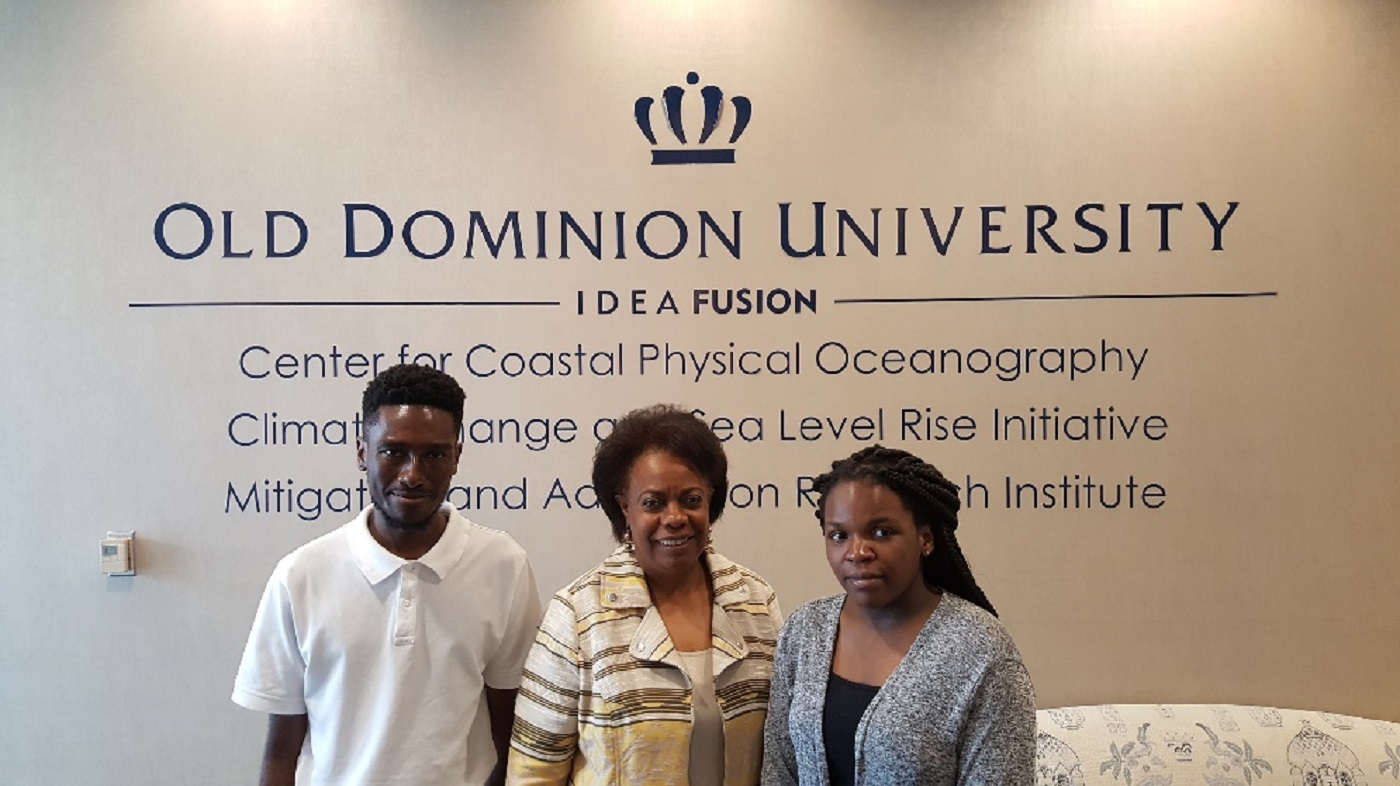Meet Dr. Bernadette Holmes, Bryan Clayborne & Mikel Johnson
Faculty-student team investigated the impacts of climate change on disadvantaged minority communities
When a natural disaster such as a hurricane strikes a community, the population often falls into two categories: those who evacuate and those who do not.
What factors determine who goes and who stays? What are the ramifications for those who stay?

Holmes, Clayborne and Johnson conducted a case study in Portsmouth, Virginia, a marginalized area where socioeconomic and race disparities potentially play a role in the community’s response to natural disasters. The team analyzed community issues, residential decisions, and social and behavioral responses to environmental issues.
“When looking at the U.S. national preparedness plan, policymakers assume that each household has a personal car and will be able to leave a community using evacuation routes,” explained Bryan Clayborne, a student at Norfolk State University (NSU), Norfolk, Virginia.
“Those with resources are more likely to be prepared for an emergency or leave the area. However, those without resources are forced to stay behind and deal with whatever comes,” he continued.
Recently Clayborne and fellow NSU student Mikel Johnson conducted research with their professor, Bernadette Holmes, Ph.D., through the U.S. Department of Homeland Security (DHS) Summer Research Team (SRT) Program for Minority Serving Institutions.
The SRT Program is designed to increase scientific leadership at Minority Serving Institutions in DHS research areas. The program provides faculty and student research teams the opportunity to conduct research at university-based DHS Centers of Excellence.
Holmes, Clayborne and Johnson conducted a case study in Portsmouth, Virginia, a marginalized area where socioeconomic and race disparities potentially play a role in the community’s response to natural disasters. The team analyzed community issues, residential decisions, and social and behavioral responses to environmental issues.
The team worked with the Coastal Resilience Center of Excellence, which seeks to improve the nation’s resilience in dealing with natural disasters, particularly coastal hazards like floods and hurricanes. To ensure the safety of residents during a crisis, a better understanding is needed about the effects of natural disasters on certain populations and the safeguards necessary to prepare for such disasters.
Specifically, the team examined the African-American community because minority communities are often disproportionately impacted by environmental issues, such as natural disasters.
The team collaborated with a SRT group led by Camellia Okpodu, Ph.D., a NSU biology professor. This group investigated sea level rise by examining the biological response to changes along the coast. The collaboration fostered synergy between the social science and biology teams and offered social science students’ exposure to laboratory time and biology students’ exposure to the sociological side of human interaction with the environment.
Holmes reflected, “This program has given me the opportunity to collaborate with a colleague in another school at my institution and share research interests. It has expanded my research agenda and afforded me new opportunities for curriculum enhancement.”
In 2018, the social science team will continue research by working with Portsmouth churches to collect qualitative information in the form of photographs and field notes. Also, they will examine abandoned houses, trash issues, drug usage, employment rates, and crime. “We will work with Portsmouth residents to see how storms and flooding are affecting them,” Johnson explained.
As a result of her experience with the SRT Program, Holmes designed a new social inequality and environmentalism course entitled “Environmental Crime and Justice.” The emerging area of “green criminology” is part of the curriculum development plan developed by Holmes for the Criminal Justice Program.
“Curriculum enhancement and development are critical to addressing the graduate school pipeline issue and preparing minority students for careers in national security,” said Holmes.
“Over the 10 weeks, I have seen development in myself as a student and leader,” reflected Clayborne, who hopes to continue his study on marginalized communities and coastal changes in graduate school.
“I learned so much about myself during this experience. I managed to conquer some of my fears with personal speaking, and I learned better ways to conduct my research effectively,” said Johnson. “I really enjoyed my experience with this project and with my team members. I would tell whoever would like to apply or be a part of this amazing program to stay focused because you can achieve so many great things,” she continued.
Clayborne and Johnson returned to NSU to finish their bachelor’s degrees. Clayborne intends to pursue a master’s degree in environmental sociology, and Johnson intends to study environmental law.
The DHS SRT Program is funded by DHS and administered through the U.S. Department of Energy’s (DOE) Oak Ridge Institute for Science and Education (ORISE). ORISE is managed for DOE by Oak Ridge Associated Universities.
